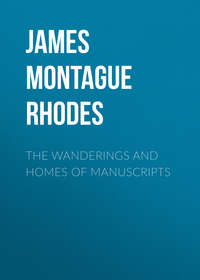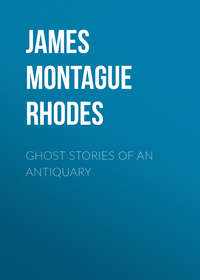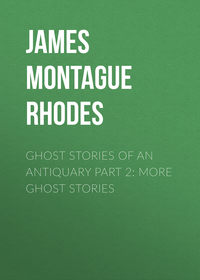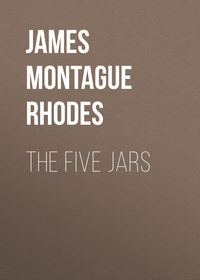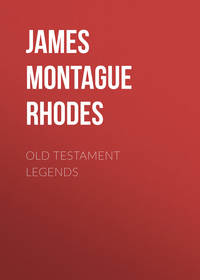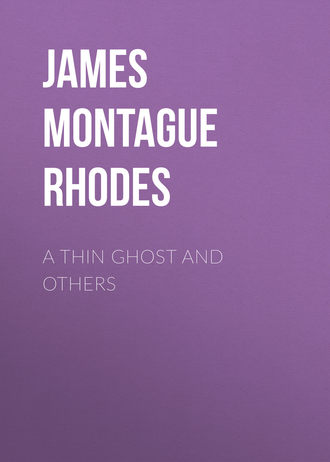
A Thin Ghost and Others
In fact, Mr. Bowman did accompany us on our exploration, but though I am sure his genuine wish was to be helpful, I am afraid he did not contribute to the serious side of it. He appeared to be under the impression that we were likely to meet either Uncle Henry or the person responsible for his disappearance, walking about the fields—and did a great deal of shading his eyes with his hand and calling our attention, by pointing with his stick, to distant cattle and labourers. He held several long conversations with old women whom we met, and was very strict and severe in his manner—but on each occasion returned to our party saying, "Well, I find she don't seem to 'ave no connexion with this sad affair. I think you may take it from me, sir, as there's little or no light to be looked for from that quarter; not without she's keeping somethink back intentional."
We gained no appreciable result, as I told you at starting; the Bow Street men have left the town, whether for London or not, I am not sure.
This evening I had company in the shape of a bagman, a smartish fellow. He knew what was going forward, but though he has been on the roads for some days about here, he had nothing to tell of suspicious characters—tramps, wandering sailors or gipsies. He was very full of a capital Punch and Judy Show he had seen this same day at W–, and asked if it had been here yet, and advised me by no means to miss it if it does come. The best Punch and the best Toby dog, he said, he had ever come across. Toby dogs, you know, are the last new thing in the shows. I have only seen one myself, but before long all the men will have them.
Now why, you will want to know, do I trouble to write all this to you? I am obliged to do it, because it has something to do with another absurd trifle (as you will inevitably say), which in my present state of rather unquiet fancy—nothing more, perhaps—I have to put down. It is a dream, sir, which I am going to record, and I must say it is one of the oddest I have had. Is there anything in it beyond what the bagman's talk and Uncle Henry's disappearance could have suggested? You, I repeat, shall judge: I am not in a sufficiently cool and judicial frame to do so.
It began with what I can only describe as a pulling aside of curtains: and I found myself seated in a place—I don't know whether in doors or out. There were people—only a few—on either side of me, but I did not recognize them, or indeed think much about them. They never spoke, but, so far as I remember, were all grave and pale-faced and looked fixedly before them. Facing me there was a Punch and Judy Show, perhaps rather larger than the ordinary ones, painted with black figures on a reddish-yellow ground. Behind it and on each side was only darkness, but in front there was a sufficiency of light. I was "strung up" to a high degree of expectation and listened every moment to hear the panpipes and the Roo-too-too-it. Instead of that there came suddenly an enormous—I can use no other word—an enormous single toll of a bell, I don't know from how far off—somewhere behind. The little curtain flew up and the drama began.
I believe someone once tried to re-write Punch as a serious tragedy; but whoever he may have been, this performance would have suited him exactly. There was something Satanic about the hero. He varied his methods of attack: for some of his victims he lay in wait, and to see his horrible face—it was yellowish white, I may remark—peering round the wings made me think of the Vampyre in Fuseli's foul sketch. To others he was polite and carneying—particularly to the unfortunate alien who can only say Shallabalah—though what Punch said I never could catch. But with all of them I came to dread the moment of death. The crack of the stick on their skulls, which in the ordinary way delights me, had here a crushing sound as if the bone was giving way, and the victims quivered and kicked as they lay. The baby—it sounds more ridiculous as I go on—the baby, I am sure, was alive. Punch wrung its neck, and if the choke or squeak which it gave were not real, I know nothing of reality.
The stage got perceptibly darker as each crime was consummated, and at last there was one murder which was done quite in the dark, so that I could see nothing of the victim, and took some time to effect. It was accompanied by hard breathing and horrid muffled sounds, and after it Punch came and sat on the foot-board and fanned himself and looked at his shoes, which were bloody, and hung his head on one side, and sniggered in so deadly a fashion that I saw some of those beside me cover their faces, and I would gladly have done the same. But in the meantime the scene behind Punch was clearing, and showed, not the usual house front, but something more ambitious—a grove of trees and the gentle slope of a hill, with a very natural—in fact, I should say a real—moon shining on it. Over this there rose slowly an object which I soon perceived to be a human figure with something peculiar about the head—what, I was unable at first to see. It did not stand on its feet, but began creeping or dragging itself across the middle distance towards Punch, who still sat back to it; and by this time, I may remark (though it did not occur to me at the moment) that all pretence of this being a puppet show had vanished. Punch was still Punch, it is true, but, like the others, was in some sense a live creature, and both moved themselves at their own will.
When I next glanced at him he was sitting in malignant reflection; but in another instant something seemed to attract his attention, and he first sat up sharply and then turned round, and evidently caught sight of the person that was approaching him and was in fact now very near. Then, indeed, did he show unmistakable signs of terror: catching up his stick, he rushed towards the wood, only just eluding the arm of his pursuer, which was suddenly flung out to intercept him. It was with a revulsion which I cannot easily express that I now saw more or less clearly what this pursuer was like. He was a sturdy figure clad in black, and, as I thought, wearing bands: his head was covered with a whitish bag.
The chase which now began lasted I do not know how long, now among the trees, now along the slope of the field, sometimes both figures disappearing wholly for a few seconds, and only some uncertain sounds letting one know that they were still afoot. At length there came a moment when Punch, evidently exhausted, staggered in from the left and threw himself down among the trees. His pursuer was not long after him, and came looking uncertainly from side to side. Then, catching sight of the figure on the ground, he too threw himself down—his back was turned to the audience—with a swift motion twitched the covering from his head, and thrust his face into that of Punch. Everything on the instant grew dark.
There was one long, loud, shuddering scream, and I awoke to find myself looking straight into the face of—what in all the world do you think?—but a large owl, which was seated on my window-sill immediately opposite my bed-foot, holding up its wings like two shrouded arms. I caught the fierce glance of its yellow eyes, and then it was gone. I heard the single enormous bell again—very likely, as you are saying to yourself, the church clock; but I do not think so—and then I was broad awake.
All this, I may say, happened within the last half-hour. There was no probability of my getting to sleep again, so I got up, put on clothes enough to keep me warm, and am writing this rigmarole in the first hours of Christmas Day. Have I left out anything? Yes, there was no Toby dog, and the names over the front of the Punch and Judy booth were Kidman and Gallop, which were certainly not what the bagman told me to look out for.
By this time, I feel a little more as if I could sleep, so this shall be sealed and wafered.
LETTER IV
Dec. 26, '37.My Dear Robert,—All is over. The body has been found. I do not make excuses for not having sent off my news by last night's mail, for the simple reason that I was incapable of putting pen to paper. The events that attended the discovery bewildered me so completely that I needed what I could get of a night's rest to enable me to face the situation at all. Now I can give you my journal of the day, certainly the strangest Christmas Day that ever I spent or am likely to spend.
The first incident was not very serious. Mr. Bowman had, I think, been keeping Christmas Eve, and was a little inclined to be captious: at least, he was not on foot very early, and to judge from what I could hear, neither men or maids could do anything to please him. The latter were certainly reduced to tears; nor am I sure that Mr. Bowman succeeded in preserving a manly composure. At any rate, when I came downstairs, it was in a broken voice that he wished me the compliments of the season, and a little later on, when he paid his visit of ceremony at breakfast, he was far from cheerful: even Byronic, I might almost say, in his outlook on life.
"I don't know," he said, "if you think with me, sir; but every Christmas as comes round the world seems a hollerer thing to me. Why, take an example now from what lays under my own eye. There's my servant Eliza—been with me now for going on fifteen years. I thought I could have placed my confidence in Elizar, and yet this very morning—Christmas morning too, of all the blessed days in the year—with the bells a ringing and—and—all like that—I say, this very morning, had it not have been for Providence watching over us all, that girl would have put—indeed I may go so far to say, 'ad put the cheese on your breakfast table–" He saw I was about to speak, and waved his hand at me. "It's all very well for you to say, 'Yes, Mr. Bowman, but you took away the cheese and locked it up in the cupboard,' which I did, and have the key here, or if not the actual key one very much about the same size. That's true enough, sir, but what do you think is the effect of that action on me? Why it's no exaggeration for me to say that the ground is cut from under my feet. And yet when I said as much to Eliza, not nasty, mind you, but just firm like, what was my return? 'Oh,' she says: 'Well,' she says, 'there wasn't no bones broke, I suppose.' Well, sir, it 'urt me, that's all I can say: it 'urt me, and I don't like to think of it now."
There was an ominous pause here, in which I ventured to say something like, "Yes, very trying," and then asked at what hour the church service was to be. "Eleven o'clock," Mr. Bowman said with a heavy sigh. "Ah, you won't have no such discourse from poor Mr. Lucas as what you would have done from our late Rector. Him and me may have had our little differences, and did do, more's the pity."
I could see that a powerful effort was needed to keep him off the vexed question of the cask of beer, but he made it. "But I will say this, that a better preacher, nor yet one to stand faster by his rights, or what he considered to be his rights—however, that's not the question now—I for one, never set under. Some might say, 'Was he a eloquent man?' and to that my answer would be: 'Well, there you've a better right per'aps to speak of your own uncle than what I have.' Others might ask, 'Did he keep a hold of his congregation?' and there again I should reply, 'That depends.' But as I say—Yes, Eliza, my girl, I'm coming—eleven o'clock, sir, and you inquire for the King's Head pew." I believe Eliza had been very near the door, and shall consider it in my vail.
The next episode was church: I felt Mr. Lucas had a difficult task in doing justice to Christmas sentiments, and also to the feeling of disquiet and regret which, whatever Mr. Bowman might say, was clearly prevalent. I do not think he rose to the occasion. I was uncomfortable. The organ wolved—you know what I mean: the wind died—twice in the Christmas Hymn, and the tenor bell, I suppose owing to some negligence on the part of the ringers, kept sounding faintly about once in a minute during the sermon. The clerk sent up a man to see to it, but he seemed unable to do much. I was glad when it was over. There was an odd incident, too, before the service. I went in rather early, and came upon two men carrying the parish bier back to its place under the tower. From what I overheard them saying, it appeared that it had been put out by mistake, by some one who was not there. I also saw the clerk busy folding up a moth-eaten velvet pall—not a sight for Christmas Day.
I dined soon after this, and then, feeling disinclined to go out, took my seat by the fire in the parlour, with the last number of Pickwick, which I had been saving up for some days. I thought I could be sure of keeping awake over this, but I turned out as bad as our friend Smith. I suppose it was half-past two when I was roused by a piercing whistle and laughing and talking voices outside in the market-place. It was a Punch and Judy—I had no doubt the one that my bagman had seen at W–. I was half delighted, half not—the latter because my unpleasant dream came back to me so vividly; but, anyhow, I determined to see it through, and I sent Eliza out with a crown-piece to the performers and a request that they would face my window if they could manage it.
The show was a very smart new one; the names of the proprietors, I need hardly tell you, were Italian, Foresta and Calpigi. The Toby dog was there, as I had been led to expect. All B– turned out, but did not obstruct my view, for I was at the large first-floor window and not ten yards away.
The play began on the stroke of a quarter to three by the church clock. Certainly it was very good; and I was soon relieved to find that the disgust my dream had given me for Punch's onslaughts on his ill-starred visitors was only transient. I laughed at the demise of the Turncock, the Foreigner, the Beadle, and even the baby. The only drawback was the Toby dog's developing a tendency to howl in the wrong place. Something had occurred, I suppose, to upset him, and something considerable: for, I forget exactly at what point, he gave a most lamentable cry, leapt off the foot board, and shot away across the market-place and down a side street. There was a stage-wait, but only a brief one. I suppose the men decided that it was no good going after him, and that he was likely to turn up again at night.
We went on. Punch dealt faithfully with Judy, and in fact with all comers; and then came the moment when the gallows was erected, and the great scene with Mr. Ketch was to be enacted. It was now that something happened of which I can certainly not yet see the import fully. You have witnessed an execution, and know what the criminal's head looks like with the cap on. If you are like me, you never wish to think of it again, and I do not willingly remind you of it. It was just such a head as that, that I, from my somewhat higher post, saw in the inside of the show-box; but at first the audience did not see it. I expected it to emerge into their view, but instead of that there slowly rose for a few seconds an uncovered face, with an expression of terror upon it, of which I have never imagined the like. It seemed as if the man, whoever he was, was being forcibly lifted, with his arms somehow pinioned or held back, towards the little gibbet on the stage. I could just see the nightcapped head behind him. Then there was a cry and a crash. The whole show-box fell over backwards; kicking legs were seen among the ruins, and then two figures—as some said; I can only answer for one—were visible running at top speed across the square and disappearing in a lane which leads to the fields.
Of course everybody gave chase. I followed; but the pace was killing, and very few were in, literally, at the death. It happened in a chalk pit: the man went over the edge quite blindly and broke his neck. They searched everywhere for the other, until it occurred to me to ask whether he had ever left the market-place. At first everyone was sure that he had; but when we came to look, he was there, under the show-box, dead too.
But in the chalk pit it was that poor Uncle Henry's body was found, with a sack over the head, the throat horribly mangled. It was a peaked corner of the sack sticking out of the soil that attracted attention. I cannot bring myself to write in greater detail.
I forgot to say the men's real names were Kidman and Gallop. I feel sure I have heard them, but no one here seems to know anything about them.
I am coming to you as soon as I can after the funeral. I must tell you when we meet what I think of it all.
TWO DOCTORS
It is a very common thing, in my experience, to find papers shut up in old books; but one of the rarest things to come across any such that are at all interesting. Still it does happen, and one should never destroy them unlooked at. Now it was a practice of mine before the war occasionally to buy old ledgers of which the paper was good, and which possessed a good many blank leaves, and to extract these and use them for my own notes and writings. One such I purchased for a small sum in 1911. It was tightly clasped, and its boards were warped by having for years been obliged to embrace a number of extraneous sheets. Three-quarters of this inserted matter had lost all vestige of importance for any living human being: one bundle had not. That it belonged to a lawyer is certain, for it is endorsed: The strangest case I have yet met, and bears initials, and an address in Gray's Inn. It is only materials for a case, and consists of statements by possible witnesses. The man who would have been the defendant or prisoner seems never to have appeared. The dossier is not complete, but, such as it is, it furnishes a riddle in which the supernatural appears to play a part. You must see what you can make of it.
The following is the setting and the tale as I elicit it.
Dr. Abell was walking in his garden one afternoon waiting for his horse to be brought round that he might set out on his visits for the day. As the place was Islington, the month June, and the year 1718, we conceive the surroundings as being countrified and pleasant. To him entered his confidential servant, Luke Jennett, who had been with him twenty years.
"I said I wished to speak to him, and what I had to say might take some quarter of an hour. He accordingly bade me go into his study, which was a room opening on the terrace path where he was walking, and came in himself and sat down. I told him that, much against my will, I must look out for another place. He inquired what was my reason, in consideration I had been so long with him. I said if he would excuse me he would do me a great kindness, because (this appears to have been common form even in 1718) I was one that always liked to have everything pleasant about me. As well as I can remember, he said that was his case likewise, but he would wish to know why I should change my mind after so many years, and, says he, 'you know there can be no talk of a remembrance of you in my will if you leave my service now.' I said I had made my reckoning of that.
"'Then,' says he, 'you must have some complaint to make, and if I could I would willingly set it right.' And at that I told him, not seeing how I could keep it back, the matter of my former affidavit and of the bedstaff in the dispensing-room, and said that a house where such things happened was no place for me. At which he, looking very black upon me, said no more, but called me fool, and said he would pay what was owing me in the morning; and so, his horse being waiting, went out. So for that night I lodged with my sister's husband near Battle Bridge and came early next morning to my late master, who then made a great matter that I had not lain in his house and stopped a crown out of my wages owing.
"After that I took service here and there, not for long at a time, and saw no more of him till I came to be Dr. Quinn's man at Dodds Hall in Islington."
There is one very obscure part in this statement, namely, the reference to the former affidavit and the matter of the bedstaff. The former affidavit is not in the bundle of papers. It is to be feared that it was taken out to be read because of its special oddity, and not put back. Of what nature the story was may be guessed later, but as yet no clue has been put into our hands.
The Rector of Islington, Jonathan Pratt, is the next to step forward. He furnishes particulars of the standing and reputation of Dr. Abell and Dr. Quinn, both of whom lived and practised in his parish.
"It is not to be supposed," he says, "that a physician should be a regular attendant at morning and evening prayers, or at the Wednesday lectures, but within the measure of their ability I would say that both these persons fulfilled their obligations as loyal members of the Church of England. At the same time (as you desire my private mind) I must say, in the language of the schools, distinguo. Dr. A. was to me a source of perplexity, Dr. Q. to my eye a plain, honest believer, not inquiring over closely into points of belief, but squaring his practice to what lights he had. The other interested himself in questions to which Providence, as I hold, designs no answer to be given us in this state: he would ask me, for example, what place I believed those beings now to hold in the scheme of creation which by some are thought neither to have stood fast when the rebel angels fell, nor to have joined with them to the full pitch of their transgression.
"As was suitable, my first answer to him was a question, What warrant he had for supposing any such beings to exist? for that there was none in Scripture I took it he was aware. It appeared—for as I am on the subject, the whole tale may be given—that he grounded himself on such passages as that of the satyr which Jerome tells us conversed with Antony; but thought too that some parts of Scripture might be cited in support. 'And besides,' said he, 'you know 'tis the universal belief among those that spend their days and nights abroad, and I would add that if your calling took you so continuously as it does me about the country lanes by night, you might not be so surprised as I see you to be by my suggestion.' 'You are then of John Milton's mind,' I said, 'and hold that
Millions of spiritual creatures walk the earthUnseen, both when we wake and when we sleep.'"'I do not know,' he said, 'why Milton should take upon himself to say "unseen"; though to be sure he was blind when he wrote that. But for the rest, why, yes, I think he was in the right.' 'Well,' I said, 'though not so often as you, I am not seldom called abroad pretty late; but I have no mind of meeting a satyr in our Islington lanes in all the years I have been here; and if you have had the better luck, I am sure the Royal Society would be glad to know of it.'
"I am reminded of these trifling expressions because Dr. A. took them so ill, stamping out of the room in a huff with some such word as that these high and dry parsons had no eyes but for a prayerbook or a pint of wine.
"But this was not the only time that our conversation took a remarkable turn. There was an evening when he came in, at first seeming gay and in good spirits, but afterwards as he sat and smoked by the fire falling into a musing way; out of which to rouse him I said pleasantly that I supposed he had had no meetings of late with his odd friends. A question which did effectually arouse him, for he looked most wildly, and as if scared, upon me, and said, 'You were never there? I did not see you. Who brought you?' And then in a more collected tone, 'What was this about a meeting? I believe I must have been in a doze.' To which I answered that I was thinking of fauns and centaurs in the dark lane, and not of a witches' Sabbath; but it seemed he took it differently.
"'Well,' said he, 'I can plead guilty to neither; but I find you very much more of a sceptic than becomes your cloth. If you care to know about the dark lane you might do worse than ask my housekeeper that lived at the other end of it when she was a child.' 'Yes,' said I, 'and the old women in the almshouse and the children in the kennel. If I were you, I would send to your brother Quinn for a bolus to clear your brain.' 'Damn Quinn,' says he; 'talk no more of him: he has embezzled four of my best patients this month; I believe it is that cursed man of his, Jennett, that used to be with me, his tongue is never still; it should be nailed to the pillory if he had his deserts.' This, I may say, was the only time of his showing me that he had any grudge against either Dr. Quinn or Jennett, and as was my business, I did my best to persuade him he was mistaken in them. Yet it could not be denied that some respectable families in the parish had given him the cold shoulder, and for no reason that they were willing to allege. The end was that he said he had not done so ill at Islington but that he could afford to live at ease elsewhere when he chose, and anyhow he bore Dr. Quinn no malice. I think I now remember what observation of mine drew him into the train of thought which he next pursued. It was, I believe, my mentioning some juggling tricks which my brother in the East Indies had seen at the court of the Rajah of Mysore. 'A convenient thing enough,' said Dr. Abell to me, 'if by some arrangement a man could get the power of communicating motion and energy to inanimate objects.' 'As if the axe should move itself against him that lifts it; something of that kind?' 'Well, I don't know that that was in my mind so much; but if you could summon such a volume from your shelf or even order it to open at the right page.'


